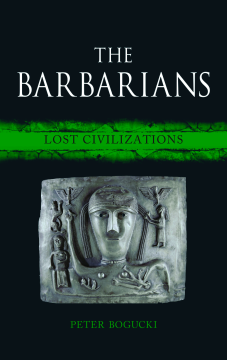
Additional Information
Book Details
Abstract
We often think of the civilizations of ancient Greece and Rome as discrete incubators of Western culture, places where ideas about everything from government to art to philosophy were free to develop and then be distributed outward into the wider Mediterranean world. But as Peter Bogucki reminds us in this book, Greece and Rome did not develop in isolation. All around them were rural communities who had remarkably different cultures, ones few of us know anything about. Telling the stories of these nearly forgotten people, he offers a long-overdue enrichment of how we think about classical antiquity.
As Bogucki shows, the lands to the north of the Greek and Roman peninsulas were inhabited by non-literate communities that stretched across river valleys, mountains, plains, and shorelines from the Atlantic Ocean in the west to the Ural Mountains in the east. What we know about them is almost exclusively through archeological finds of settlements, offerings, monuments, and burials—but these remnants paint a portrait that is just as compelling as that of the great literate, urban civilizations of this time. Bogucki sketches the development of these groups’ cultures from the Stone Age through the collapse of the Roman Empire in the west, highlighting the increasing complexity of their societal structures, their technological accomplishments, and their distinct cultural practices. He shows that we are still learning much about them, as he examines new historical and archeological discoveries as well as the ways our knowledge about these groups has led to a vibrant tourist industry and even influenced politics. The result is a fascinating account of several nearly vanished cultures and the modern methods that have allowed us to rescue them from historical oblivion.
“Bogucki takes us on a travel tour of Europe, offering a series of wonderfully written vignettes about sites and situations of the prehistoric past. The Barbarians is an ideal way for students and lay readers alike to enter into the past with ease.”
— Ian W. Brown, University of Alabama
"I'm fascinated by barbarians, just as I'm fascinated by Greeks and Romans and Egyptians—though I'm fascinated with the latter because they were literate and we know so much about them. With barbarians the attraction is equal and opposite: they fascinate because they wrote nothing, and we know so little about them. Or rather, what we know must be inferred from the material remains of these prehistoric Europeans. Archaeologist Bogucki is thus an ideal candidate to write a general-interest book about 'barbarians' for the Reaktion Lost Civilizations series. He starts way back."
— Tim Morris, lection
Winner of the Popular Book Award 2018
— Society for American Archaeology
"The Vandals did vandalize Rome, but were the barbarians truly barbarous? This is the question asked by Bogucki in his new book The Barbarians, a thought-provoking, highly readable addition to Reaktion’s always interesting Lost Civilizations series."
— Minerva
"Bogucki offers a concise and clearly written summary of the archaeology of 'prehistoric' Europe. . . . The focus on less-acknowledged European groups and their numerous complex lifeways serves as a counterpoint to the well-known ancient Greeks and Romans. The introduction in the book is particularly valuable for educating popular readers on the techniques of archaeology and it offers a brief account of its history in Europe. . . . The color photographs in the book were selected with great care and their quality is exceptional. This engaging book comes highly recommended for those who want to learn more about the ancestors of present-day Europeans."
— Society for American Archaeology
"Bogucki successfully shows that the barbarian world was not flat and monolithic, and he sheds light on the development of the barbarian cultures over the centuries as a result of migrations and interactions with other civilizations."
— The Historian
Peter Bogucki is associate dean for undergraduate affairs in the School of Engineering and Applied Science at Princeton University and an archeologist. He is the author The Origins of Human Society and editor of Ancient Europe.
Table of Contents
| Section Title | Page | Action | Price |
|---|---|---|---|
| Cover | Cover | ||
| The Barbarians: Lost Civilizations | 3 | ||
| Imprint Page | 4 | ||
| Contents | 5 | ||
| Chronology | 6 | ||
| Preface | 11 | ||
| Introduction | 13 | ||
| 1. Hunters, Fishers, Farmers and Metalworkers | 26 | ||
| 2. Connections, Rituals and Symbols | 58 | ||
| 3. Trade, Salt, Greeks and Wealth | 87 | ||
| 4. Romans Encounter the High Iron Age | 115 | ||
| 5. Barbarians beyond the Imperial Frontier | 154 | ||
| 6. Barbarians Live On | 189 | ||
| References | 215 | ||
| Bibliography | 227 | ||
| Acknowledgements | 237 | ||
| Photo Acknowledgements | 239 | ||
| Index | 241 |
